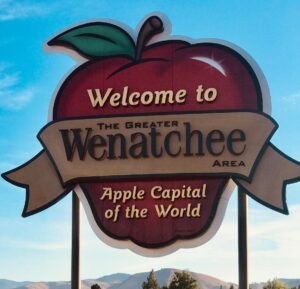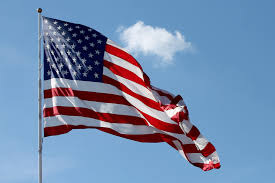I was seven when my parents piled us into the station wagon for a ride over the Cascade Mountains to Great Uncle Jim’s for the Apple Blossom Festival. One of Mom’s cousins was supposed to be Parade Grand Marshal.
It was 1965 and, like today, Washington was king of American apple production. Wenatchee was at the center of it all, the Apple Capital, if you will. Apple blossoms are literally a promise of continued prosperity, so the festival was, and still is, a pretty big deal: parades, beauty queens, carnivals, arcade games, Chamber of Commerce speeches.

I don’t remember any of that. I can’t even recall which cousin rode at the head of the parade.
My only memory is Uncle Jim. His grin made me feel like I was the only person in the world who mattered. And I got to ride in the front seat of that Chrysler land yacht he drove around town.
“Hey Will, push that button there for me, would ya?” He pointed to a white gadget on the dash as he eased into his driveway. At the touch of a finger, my whole world changed. I watched, shocked, as Uncle Jim’s garage door tilted open while he sat proud, chuckling behind the wheel.
Safe inside, I pressed the button again and we shut the world behind us.
It was a watershed moment. I lived seven years before that day, seven innocent years before Uncle Jim’s garage door swung open like a two-car Pandora’s box.
Back home, people stopped in the driveway, said hi to the neighbors, and hefted their garage doors by hand. My dad didn’t even bother with the driveway. He hopped out at the curb every afternoon, and chatted up whoever was on the street before he came inside for dinner.
Dad was a legend with the Hudson boys. The hoop in their driveway across from us collected a motley gaggle of little Jerry Wests from up and down the block. Dad knew all their names.
“Hey Douggie! Gimme the ball!”
His routine never changed. Dad laid his briefcase on the trunk of his Plymouth and caught the outlet pass in his mortgage-banker coat and tie. He turned his back, shiny wingtips astride the crack that ran down the middle of 52nd, dribbled once, glanced left over his shoulder, and launched a graceful 50-foot hook shot. Which missed. Every time.
Dad tossed hooks until those kids all grew up and moved away, and he never sank that shot. It all seemed like a big nothing to me, just my dorky embarrassing old man. But I ran into to one of those Hudson boys decades later, and he still carried that memory close: a middle-aged man in a stiff business suit but not too far detached from his own childhood, a man who had time for them, who called them by name. A man who gave a damn about everyone on the street and didn’t mind saying so with his actions.
Uncle Jim was a great man too, a generous community leader, kind and gentle. He’s been gone for decades and I still miss his warmth. He didn’t mind showing off some groundbreaking technology. And just like the rest of us, he had no idea what that miraculous white button had wrought.
Sixty years later, we’re disconnected behind our automatic garage doors. We’re selfish. We don’t know our neighbors because we drive right by, hit the remote, shut them out. And we don’t have to care about neighbors we don’t know. We never see their kids either. Our neighbors don’t let Junior out to shoot hoops in the driveway, because they won’t take that risk when they don’t know their neighbors.
Think about that downward spiral for a minute. In a couple generations we created a world so scary that we won’t even let our kids out into the scary world we created. And our kids get their fears from us, and their fears will create the next generation’s scarier world, and when does it end?
And if, on our way home one sunny afternoon, we come upon that rare ballgame in the street? We don’t stop to say hello or join in. God forbid. What would the neighbors think? Nope, we barrel on by, gotta get home behind that big rolling door to check our messages.
We ignore a whole community’s kids and turn our backs on each other because we won’t even get to know the people a few yards away on our own damn street. Yet we get manipulated – on the same phones we were so anxious to get home and see – into online tribes that align with our hopes and fears. Mostly our fears.
He’s a fascist. She’s a threat to democracy. They despise America. They’re enemies of the people. Labels like woke, libtard, nazi, racist, all kinds of ists and isms and phobes get tossed around so easily they lose their meaning. Yet we hold to our rock-solid certainty that the other side deserves our derision. Our ridicule. Our hate.
It’s easy enough to believe it all, to gorge on every bit of vetted, slanted news our screens feed to us. Behind our garage doors, safely parked in our kitchens and on our sofas, we don’t have to look a human in the eye. It’s simple to “grab a root and growl,” in my late father’s words. We pick a side, we shut our ears to reason, we sink our teeth in. We clamp down harder at the slightest scent of evidence to the contrary. And we never, never let go.
It’s easy. And it’s cowardly. And if we believe in America, it’s horribly, tragically, unpatriotic.
“America First” seems admirable. It shines like a beacon of unity, doesn’t it? Like something we can all get behind, hands on our hearts, one nation under God and what not.

Then we battle over what it means. And it’s surely a battle. From actual policy stances on borders, fracking, deportations, broken treaties, and tariffs, to sketchy definitions of patriotism, DEI, wokeness, racism, and misogyny, American patriots are more confused than ever on how to put our great nation first.
Do we believe in America? If we do, can we really put our great nation first? How is that possible if we won’t even talk to the family right next door?
Here’s how. Leave the damn garage door open. Park at the curb. Take risks. Say hello. Shake hands. Throw a ball around with the neighbor kid. Have a potluck. Start a neighborhood watch. It’s patriotic when we take care of each other.
Real patriots are kind. We put America First when we’re kind to each other. We can still be kind even if our neighbor’s politics don’t line up with ours.
If we love our country, we keep our fellow Americans safe. We obey the law. We drive the speed limit. We drive sober.
We pay our taxes, straight up, no cheating. And we take our jury summons seriously, because we believe in pulling our weight. We ask ourselves, if I don’t do it, who will? If we love our country – if we put America First – we willingly sacrifice a few days of our lives in the cause of justice.
Patriots are good to our earth, our air, our water. Our grandparents may have damn near destroyed it, but what about us? It’s our turn now. Will we leave this place better than we found it? America, and tomorrow’s Americans, are watching, counting on us to do better.
Patriots know we’re all stronger when we raise up the downtrodden and the weak, when we reach out in caring and empathy to the marginalized. Patriots look for ways to make our communities better. We ask ourselves how we can make a difference. Housing? Justice? Food? Music? Art? Volunteer opportunities go begging every day in every town around the Land of the Free. We can make our great nation greater today with our hands, our brains, our hearts, our talent, our time. America thrives when we give of ourselves.
By all means patriots have a God-given right to hold on to our values. But we must be brave enough to listen to others. Resilient enough to change our minds. Strong enough to seek common ground. Intelligent enough to recognize nuance and consider details. Simple answers are for simple minds, and they get us nowhere.
Nowhere is exactly where we’ll be without that courage, that strength.
Nearly thirty years ago, our daughter made a new four-year-old friend down the block. As years passed and Kimmy grew up, I’d drive by and see her shooting hoops all alone in the street. Somehow – I guess it’s in my blood – it just seemed natural to pull over, stick my arm out the window, and holler “Kimmy! Gimme the ball!” I’m right-handed, but I’d toss that awkward lefty and leave her giggling and waving as I drove away.
No big thing, right?
Somewhere in those many years of southpaw bricks that passed so quick they didn’t seem like many years at all, I ran into Kimmy’s mom in the neighborhood. She took my hand and told me how much it meant to Kimmy that I paid attention to her, that when she was lonely or sad it brightened her day.
I was shocked. Was that so extraordinary? It was just a ball, a clumsy throw, a silly grin. Doesn’t everyone take fifteen seconds out of their day to simply acknowledge a kid’s existence?
Then one evening I slowed for a crowd in front of Kimmy’s place. There was nobody shooting hoops that night. But a beautiful young woman in a prom dress hollered “Bill!” and clattered to my window on high heels. She didn’t hand me a ball this time. This time, grown-up Kimmy leaned into the cab to hug me.
Turns out, yeah, fifteen seconds makes a difference. When we simply stop to laugh, to shake a hand, to take a clumsy shot at a basket, we’re really saying “hey, I see you. You exist. You matter.” And sometimes it seems so trivial, we don’t even know we’re doing something important.
We can have a whole America like that. A nation of kindness. We can put America First, starting right here, face to face with the Americans next door.
But we have to open our damn doors. If we’re to put America First, we have to be available. We have to let our neighbors, every one of them, know they’re important. We have to take that hook shot. Even if we miss every time, we’ll leave the world, and the people in it, better for our presence.
If my dad could do it, so can we.